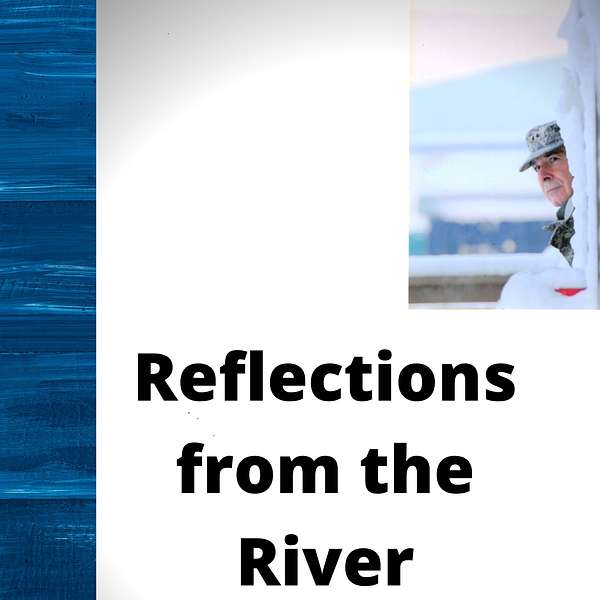
Reflections from the River
Reflections from the River
Lessons in public speaking from a master
Use Left/Right to seek, Home/End to jump to start or end. Hold shift to jump forward or backward.
Lessons in public speaking from a master-Labor Day 1974
One of the good things about getting old is the perspective one gains. You can look back and see how things have changed. Some for the better, others for the worse.
We hear so much today about how the world, the country and society at large are going to hell in a handbasket. Let me tell you a good news story…at least a good news story from my perspective, maybe not from everyone’s, but for many people.
In the early 1970’s I was fresh out of journalism school and what was then called a “cub reporter”. As a military veteran, I wasn’t the youngest cub reporter in the St. Louis metro area, but I didn’t have any gray hair in my beard or longish hair, which I still had most of, in contrast to today.
Labor Day weekend I drew the unenviable assignment of covering then Illinois State Treasurer Alan Dixon’s appearances in the Metro-east and St. Louis area. Dixon later became United States Senator Dixon and several decades later a personal friend.
Dixon was known as “Al the Pal”. He called everyone “Pal” and was a remarkably well-liked and extraordinarily gifted elected official. He had several claims to fame, one of them that he was the only Illinois office holder ever elected to all three branches of Illinois government…the judiciary, the legislative and the executive.
Dixon was from Belleville so it was only natural that my then employer, the Belleville News Democrat would send out a reporter to cover his appearances on that bright, end-of-summer holiday. Usually, it would have been an experienced political reporter, but since it was a holiday weekend, the assignment got passed down to the most junior keypounder…me.
I climbed into my nearly decade-old, used Chevy to drive to Collinsville, Illinois, for his first speech of the day to a t-shirted, beer-drinking labor union crowd. Dixon, in short shirt-sleeves and sweating on the sun-baked stage gave the crowd the speech it came to hear. His arm-waving, flush-faced oration praising unions, the working-man and Franklin Delano Roosevelt brought round after round of applause. Al was clearly the man of the hour for the industrial Illinois suburbs, known to St. Louisans as “the east side”, with its gritty steel mills, railroad switching yards and stove foundries.
Tucking my reporter’s notebook with its scribbled notes into my rear hip pocket, I slipped away from the crowd to drive back to my first-floor apartment across the street from the aroma of the Stag beer brewery in mid-town Belleville. With a couple of hours until the next speech, I needed to cool down in the breeze of my K-Mart window fan and change into something dressier.
Dixon’s next speech featured an appearance before the Illinois Manufacturing Association at a downtown St. Louis private dining club. A more different crowd and more different venue is hard to imagine. The air-conditioning chilled, dark-paneled ballroom with chandeliers, suit-clad men and jewel-draped women seated at white-linen tablecloth covered tables represented a league I’d never seen, except maybe in movies, let alone dined in.
I didn’t need to tell anyone I was a newspaper reporter. My loudly checked, one hundred per cent polyester sport coat, polyester necktie and two-tone brown shoes unmistakably marked me as a non-member of the assembly. The reporter’s notebook tucked in my sport jacket’s pocket defined my profession.
As I listened to Dixon’s speech, I wondered if it was the same speaker I’d heard a few hours earlier. I was learning a lesson I’d never learned in high school Public Speaking class. Tailor your message to your audience. Dixon seamlessly made the transition from shirt-sleeved, blue-collar, beer drinking, back-slapping union guy to dark suit clad, business-supporting, wine-sipping gentleman. Like I said, Dixon was an extraordinarily gifted elected official. He understood that we need both labor and management and had the ability to work with and appeal to both.
Just as I’d slipped away from the union crowd in Collinsville, I slipped away from the country club set with notes in my pocket and a head spinning trying to reconcile the personas I’d seen that day. As I slid into the ripped plastic bucket seat of my $600 Chevelle, the black parking lot attendant looked at me, then glanced at the private club entrance and said, “You know they wouldn’t let me in there.” Not knowing quite what to say, but recognizing his statement as bitter truth, I replied, "They wouldn’t let me in either if I wasn’t a newspaper reporter.”
That private club didn’t need a “Whites Only” sign. It simply was whites only…except of course for the kitchen and wait staff. Oh yeah, women weren’t allowed as members either. Decades later, when I joined that private dining club, not only are blacks and women members, and serve on the board of directors, it even admits ex-newspaper reporters.
So, you see, some things have changed for the better. I even dress better. I finally got rid of that polyester sports coat. My wife demanded it.
© William L. Enyart 2022
www.billenyart.com Email: bill@billenyart.com
Audio production by Tom Calhoun, www.paguytom.com